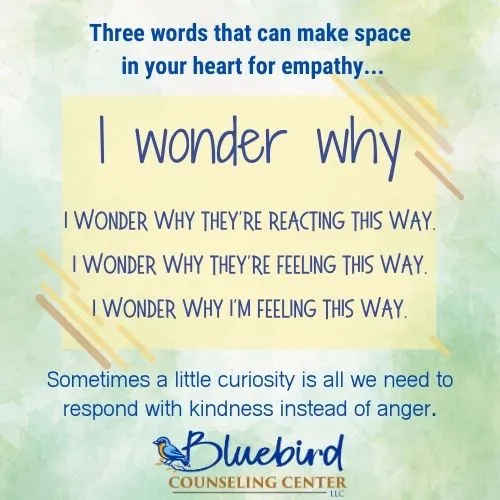
Cultivating Curiosity Over Judgment
In our fast-paced and often stressful lives, it’s easy to fall into the trap of judgment. When someone behaves in a way that frustrates or angers us, our instinct may be to criticize or blame. But what if we approached these situations with curiosity instead? At Bluebird Counseling Center LLC, we believe that adopting a curious mindset can create space for empathy and understanding in our relationships—a vital step towards healing and connection.
The Power of Curiosity
Curiosity invites us to explore rather than to criticize. When faced with challenging emotions, it’s essential to remember that everyone has their own story. Instead of judging others for their reactions or behaviors, we can choose to wonder about the reasons behind them.
Three simple words—“I wonder why”—can transform our internal dialogue and open up productive conversations. Engaging with curiosity allows us to:
- Practice Empathy: Wondering why someone is reacting in a certain way gives us insight into their feelings. This shift in perspective helps us better understand their struggles, fostering empathy and compassion.
- Examine Our Own Emotions: Asking ourselves, “I wonder why I’m feeling this way?” invites us to dig deeper into our emotions. It allows for self-reflection and understanding, which are essential for personal growth.
- Create Space for Dialogue: Curiosity encourages open communication. Instead of shutting down conversations with judgment, we can ask questions that promote a mutual understanding of perspectives.
The Shift from Judgment to Curiosity
When we react with frustration, our judgment often stems from misunderstandings. Practicing curiosity can help us move past our initial reactions. Here are a few ways to cultivate curiosity in our daily interactions:
- Pause Before Responding: Take a moment before reacting to someone’s behavior. Breathe and ask, “What might be going on for them?”
- Ask Open-Ended Questions: Instead of making assumptions, encourage dialogue by asking questions. For example, “What led you to feel this way?” or “Can you tell me more about your experience?”
- Practice Active Listening: Show genuine interest in what others share. Listening fully without preparing your response fosters an environment where curiosity can thrive.
- Reflect on Your Reactions: Notice when you feel judgment creeping in. Reframe your thought process by questioning your feelings and recognizing any unmet needs behind them.
Creating Empathy-Driven Relationships
Choosing curiosity over judgment doesn’t just benefit the relationships we have with others—it enriches our relationship with ourselves. Embracing a curious mindset can lead to more compassionate interactions and foster a collective environment of support and growth.
At Bluebird Counseling Center, we understand that navigating complex emotions and interpersonal dynamics can be challenging. We are here to guide you through these moments, helping you cultivate empathy, improve communication, and build resilience.
Conclusion
In a world filled with differences, curiosity can be our bridge. By choosing to wonder instead of judge, we create space for understanding and kindness in our lives. If you’re interested in exploring how to foster a more curious mindset—and its positive effects on your mental health—reach out to Bluebird Counseling Center today. Together, we can embark on a journey toward greater empathy and emotional well-being.

